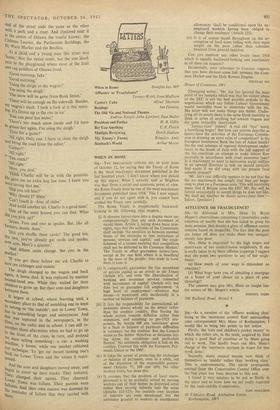When in Rome Douglas Jay. MP
Affluence or Fraudulence?
Terence Webb, Joan Mallison
Castro's Cuba Alfred Sherman Bondage Ian Fleming
The Old Vic and National Theatre Andrew Knight, John Lambert, Paul Bailey
President and Parties D. R. Gi!lie Bet You Anything C. F. Flesch Multiple Reviewing Derek Hudson My Enemy's Enemy Kingsley Amis Starbuck's World Arthur Moyse
WHEN IN ROME
SIR,—You inaccurately criticise me, in your issue of October 12, for saying that the Treaty of Rome is the 'most reactionary document published in the last hundred years.' I don't know where you picked up this report. What I actually said at Brighton was that 'from a social and economic point of view, the Rome Treaty must be one of the most reactionary documents published since 1918.' This 1 now repeat; and if you do not agree with it, you cannot have studied the Treaty very carefully.
The Rome Treaty is exceptionally backward- looking in the following vital respects:
It elevates laissez-faire into a dogma more un- compromisingly than any such document of recent times. Article 3, laying down basic prin- ciples, says that the activities of the Community shall include 'the abolition as between member States of the obstacles to free movement of persons, services and capital,' and 'the estab- lishment of a system ensuring that competition shall not be distorted in the Common Market.' The Treaty in effect guarantees laissez-faire. except in the one field where it is beneficial to the mass of the people: free trade in food. Here it bans it.
(ii) It categorically guarantees the free movement of private capital as an article in the Treaty (Article 67), and even 'the liberalisation of banking and insurance services connected with movements of capital' (Article 61); but does not so guarantee full employment. 'A high level of employment'—whatever that means—is mentioned only incidentally in a section on balance of payments.
(iii) It lays the responsibility for international ad- justments almost wholly on the debtor rather than the creditor country, thus biasing the whole system towards deflation rather than expansion, and returning to pre-1925 eco- nomics. By Article 108 any 'assistance' given to a State in balance of payments difficulties is voluntary for the creditor. But the Council issues to the debtor 'directives or decisions lay- ing down the conditions and particulars thereof.' No automatic obligation is laid on the creditor. Contrast this with the European Pay- ments Union or the IMF.
(iv) It takes the power of protecting the exchanges or balance of payments, even in a crisis, out of the discretion of the responsible govern- ment (Articles 73, 108 and 109). No other modern treaty has done this.
(v) It assumes that the problem of local unem- ployment is to be normally solved by moving workers out of their homes in distressed areas rather than moving industry into the areas (Articles 123-125). No controls over location of industry are even mentioned; but the assistance granted to workers in resettlement
allowances 'shall be conditional upon the un- employed workers having been obliged to change their residence' (Article 125).
(vi) It is of course based throughout on the as- sumption of food taxes falling with their main weight on the poor rather than subsidies. financed from general taxation.
Can you mention any other treaty since 1918 which is equally backward-looking and reactionary in all these six respects?
Incidentally, your reference to Canossa suggests that you have divined some link between the Com- mon Market and the Holy Roman Empire.
House of Comtnons. SW 1 DOUGLAS JAY
[Queequeg writes: `Mr. Jay has ignored the main point of my remarks which was that his violent abuse of the EEC is not the best possible prelude to the negotiations which any future Labour Government would inevitably have to undertake with the Six. His letter will not make things any better. Under- lying all its points there is the same blank inability to think in terms of anything but ancient slogans and the same invincible chauvinism.
'"Laissez-faire" indeed! A real old "boo" word, a horrifying bogey! But how can anyone describe as laissez-faire the activities of the European Commis- sion in drawing up strict rules of competition? Is the European Investment Bank the heir of Adam Smith? Do the vast schemes of regional development under- taken in the South of Italy with the full support of the Six constitute an attempt to make tabour flow naturally in accordance with cruel economic laws? Is it reactionary to want to harmonise social welfare in an upward direction (a task we should certainly find easier if we did away with our present food subsidy system)?
`Mr. Jay's real difficulty appears to be not that the Six are reactionary but simply that they are begin- ning to plan on a European scale. This will inevitably mean that if Britain joins the EEC Mr. Jay will be forced occasionally to accept things he does not like. We shall see whether he shouts laissez-faire then.'— Editor, Spectator.]














































 Previous page
Previous page